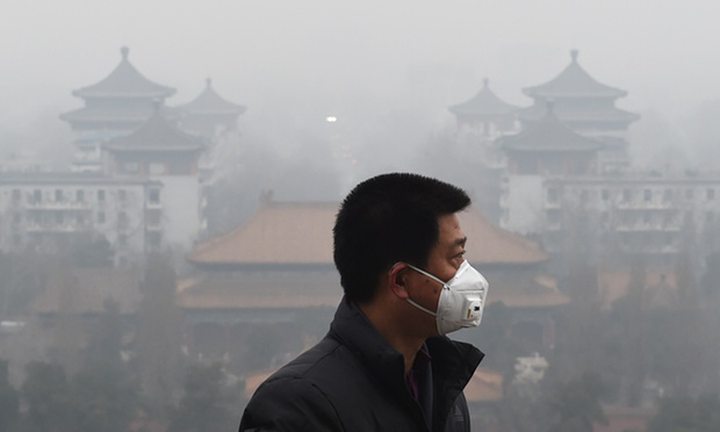Beijing Issues Red Alert Over Air Pollution for the First Time

Across the city, residents braced for another “airpocalypse” — the term that some English speakers here use for the most toxic bouts of air pollution.
If carried out properly, the temporary restrictions will affect many of Beijing’s more than 20 million residents. From 7 a.m. on Tuesday to noon on Thursday, schools will be required to close; cars will be allowed to drive only on alternate days, depending on their license plate numbers; and fireworks and outdoor barbecuing will be banned (grilled kebabs are a hugely popular street food in the city). In addition, government agencies will have to keep 30 percent of their automobiles off the streets.
An official signal of the announcement came around 6:30 p.m. Monday, when Xinhua, the state news agency, posted on its English-language Twitter account: “#Beijing issues first red alert for heavy #smog. Odd-even car ban imposed; schools suspended.” The post included a photograph of the Bird’s Nest, the stadium built for the 2008 Summer Olympics, shrouded in charcoal-gray smog and barely visible.
Around the same time, an official website of the Beijing government posted advisories on how to respond to the alarm.
One big question was whether officials would strictly enforce the regulations immediately, especially given the late notice on Monday. Many residents were left scrambling to plan for the next morning: what to do with children staying home from school, how to get to their jobs if they could not drive, whether they should even go to work.
The city government did not explain the timing of its announcement. Thick smog had already settled over Beijing by Sunday afternoon, with pollution reaching levels that the United States government labels “very unhealthy,” when everyone may experience the effects of toxic air and should avoid unnecessary outdoor activity. On Monday, even before the red alert, announcements in Beijing subway stations warned that a spell of toxic air was hitting the city and that it would last until Wednesday.
The red alert may be the Beijing government’s response to withering criticism it received from many residents last week who wondered why it had issued only an orange alert, the second highest, during the most recent “airpocalypse.” On Dec. 1, a blog post by Zhang Kai of Greenpeace East Asia asked, “What will it take for Beijing to call a Red Alert on pollution?”
Starting Nov. 28, an expanse of toxic air smothered northern China. Pollution in Beijing reached hazardous levels the next day and surged well beyond those levels on Nov. 30, when the air in some parts of the city contained deadly particulate matter called PM 2.5 that was nearly 40 times the limit recommended by the World Health Organization. It was the worst pollution of the year. The smog did not begin dissipating until late on Dec. 1, when strong winds blew across the city.
Under the system announced in 2013 and strengthened this year, Beijing is supposed to issue an alert at least 24 hours before the onset of bad smog. Officials can predict pollution levels based on wind and weather forecasts.
A red alert should go into effect if there is a prediction that the air quality index will stay above 200 for more than 72 hours. The United States government rates above 200 as “very unhealthy,” and 301 to 500 as “hazardous.” At 7 p.m. Monday, the Beijing municipal reading was 253.
The red alert was an upgrade from an orange alert issued on Saturday. By then, official Chinese news reports had already said a period of bad smog would start on Monday. Orange means outdoor construction should be halted, as well as the operations of companies that emit heavy pollution.
Chinese cities, especially northern ones, have some of the world’s worst air pollution. Most of it comes from industrial coal burning, and some from motor vehicles. The leaders in Beijing can ensure clear skies by ordering factories to shut down, but they have done so only during international summit meetings here and signature events like the military parade on Sept. 3 for the victory over Japan in World War II.
At international climate change talks, including the ones now underway in Paris, Chinese officials have promised to curb coal use in order to address both air pollution and carbon dioxide emissions.
“This week in Paris, China is rightfully getting credit for its policies to tackle climate change,” said Alex Wang, a law professor at the University of California, Los Angeles, who studies Chinese environmental policy. “But the extraordinary air pollution in Beijing right now demonstrates just how much remains to be done to make these policies work in practice.”





